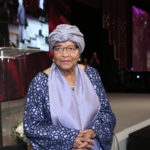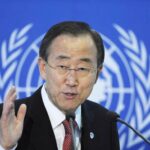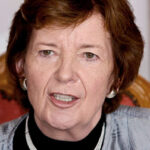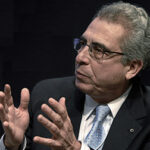To all world leaders,
Four years since it was declared a global emergency, COVID-19 continues to add to the estimated 28.5 million excess deaths associated with the pandemic.1 People and societies continue to suffer the long tail of its enormous social and economic toll. The full impacts of the disease and response are not yet fully understood. Countries are struggling with debt, inflation, weakened health systems, and social fractures. Vulnerable people, young people, and developing countries have greatly suffered.
Overall, our world is facing a range of concurrent crises, including climate emergencies and deadly conflicts. Leaders have the power – and the responsibility – to ensure that another pandemic is not added to the burden.
It is vital now to ensure successful negotiations of a pandemic accord. The formal deadline for adoption is the 77th World Health Assembly – now just four months away. Pathogens which pose pandemic threats can arise anywhere, anytime, and only be overcome through global co-operation and action.
We have come together at this critical time to call on you to lead on achieving an effective, legally-binding pandemic accord.
The accord must transcend business as usual, because the status quo has been fatal for people during this pandemic. It must assure provisions which guarantee that all countries have the capacity to detect, alert, and contain pandemic threats, and the tools and means required to protect people’s health and economic and social well being.
We welcome the efforts of negotiators in Geneva in this challenging process so far. But as the agreed adoption deadline rapidly approaches, there are worrying signs of stalemate on several issues which go to the heart of a transformative and equitable international system for pandemic preparedness and response.
To this end, we believe that there are three core provisions which must underpin the accord:
First, the pandemic accord must have equity at its heart. This includes recognising that all regions must have rapid access to the tools needed to stop outbreaks from becoming pandemics. A new approach is essential. Public health must trump private profits, and a charity-based approach is not the answer. Every region must have the capacities to research, develop, manufacture, and distribute lifesaving tools like vaccines, tests, and treatments. Skilled and passionate researchers in low- and middle- income countries (LMIC) have proven their abilities to produce these tools. Technology and knowledge transfer, combined with domestic, regional, and global support for research, development, and manufacturing hubs will make every region and the world safer.
Second, the accord must commit to a pathway to sustained financing for pandemic preparedness and response. This should include the additional $10.5 billion per annum needed for the Pandemic Fund to fill basic gaps in LMIC pandemic preparedness funding. On top of this, financing must also include ambitious increases in domestic financing for pandemic preparedness – and response – in all countries; research and development financing; provision for immediate release of funds to combat a crisis; and financing for social and economic protection. Such funding must be additional and not drain the development assistance funds required to ensure that current health services continue.
Finally, the agreement must ensure that Member States are held accountable for the commitments they make via the accord and that the world is making progress. Without such assurance, a new pathogen simply has license to spread. We recommend that countries commit to independent monitoring in the accord – both to ensure that the global status of pandemic preparedness across all countries, stakeholders, and sectors is monitored and reported to guide evidence-based decisions; and that countries are complying with the provisions of the accord. Combining best practices from monitoring of existing treaties, such as for climate, can help inform such a mechanism, with reporting used to inform actions and decisions at a regular Conference of Parties.
In summary, we call on leaders today to step up now and empower your negotiators to make the decisions which would ensure an ambitious and legally-binding pandemic accord.
It is your responsibility to collaborate globally to make the world safer and more stable. A new pandemic threat is inevitable. A new pandemic is not – if we act now. Implementation of an effective accord is vital to make COVID-19 the last pandemic of such devastation. Do not miss this history-making opportunity.
Signed,
Chairs, Co-Chairs, Members and Secretariat of The Elders, The Global Preparedness Monitoring Board (GPMB), The Independent Panel for Pandemic Preparedness and Response (The Independent Panel), Pandemic Action Network, The Panel for a Global Public Health Convention (PGPHC), and Spark Street Advisors.
Prof Ibrahim Abubakar, Pro-Provost (Health), University College London and Member of the GPMB
Dr Palitha Abeykoon, Senior Advisor to the Ministry of Health of Sri Lanka and Member of the GPMB
Mr Aggrey Aluso, Executive Director, Resilience Action Network Africa
Ms Bente Angell-Hansen, Norwegian former diplomat and Member of the GPMB
Dr Gro Harlem Brundtland, former Director-General of the World Health Organization, Member of Club de Madrid and Member of The Elders
Dr Mauricio Cárdenas, former Minister of Finance of Colombia and former Member of The Independent Panel
HE Laura Chinchilla Miranda, Former President of Costa Rica, Member of Club de Madrid and Member of the PGPHC
The Rt Hon. Helen Clark, former Prime Minister of New Zealand, Member of Club de Madrid, Member of The Elders, former Co-Chair of The Independent Panel
Prof Victor J. Dzau, President of the United States National Academy of Medicine (NAM) and Member of the GPMB
Dr Chris Elias, President of the Global Development Program at the Bill & Melinda Gates Foundation and Member of the GPMB
Dr Zijian Feng, Secretary-General and Executive Vice President of the Chinese Preventive Medicine Association and Member of the GPMB
Prof Patricia J. Garcia, Former Minister of Health of Peru and Member of the PGPHC
Ms Bience Gawanas, former Under-Secretary-General and Special Advisor on Africa to the United Nations Secretary-General and Member of the GPMB
Dr Jayati Ghosh, Professor of Economics at the University of Massachusetts Amherst and Member of the GPMB
Prof Lawrence O. Gostin, Professor and Chair in Global Health Law and Member of the PGPHC
Ms Kolinda Grabar-Kitarović, former President of Croatia and Co-Chair of the GPMB
Mr Angel Gurría, Former Secretary-General, Organization for Economic Co-operation and Development, Member of Club de Madrid and Member of the PGPHC
Ms Jane Halton, Chair, Coalition for Epidemic Preparedness Innovations (CEPI) and Member of the PGPHC
Dr Naoko Ishii, Former Deputy Vice Minister of Finance of Japan and Member of the GPMB
HE Ellen Johnson Sirleaf, former President of Liberia, Member of Club de Madrid, Member of The Elders and former Co-Chair of The Independent Panel
Dr Michel Kazatchkine, former Executive Director of The Global Fund to Fight AIDS, Tuberculosis and Malaria and former Member of The Independent Panel
Prof Ilona Kickbusch, Founder and Chair of the Global Health Centre at the Graduate Institute of International and Development Studies and Member of the GPMB
Mr. Ban Ki-Moon, former Secretary-General of the United Nations, Member of Club de Madrid and Deputy Chair of The Elders
Dr Ricardo B. Leite, President and Founder, UNITE Global Parliamentarians Network and Member of the PGPHC
Dr Joanne Liu, former International President of Doctors Without Borders and former Member of The Independent Panel
Sir Mark Lowcock, Former Head of the UN Office for the Coordination of Humanitarian Affairs (OCHA) and Member of the GPMB
Prof Jemilah Mahmood, Professor and Director, Sunway Centre for Planetary Health and Member of the PGPHC
Ms Susana Malcorra, Former Foreign Minister of Argentina, Member of Club de Madrid and Member of the GPMB
The Rt Hon, David Miliband, former Foreign Secretary of the United Kingdom and former Member of The Independent Panel
Dr Winnie Mpanju-Shumbusho, Former WHO Assistant Director General and Member of the PGPHC
Dr Anders Nordström, former Global Health Ambassador for Sweden and former Head of Secretariat of The Independent Panel
Ms Joy Phumaphi, Former Minister of Health of Botswana and Co-Chair of the GPMB
Prof Dr Maha El Rabbat, Former Minister of Health and Population of Egypt; Prof of Public Health and Member of the GPMB
Prof Elil Renganathan, Professor of Public Health and Policy and Head of Secretariat, PGPHC
HE Mary Robinson, former President of Ireland, Member of Club de Madrid and Chair of The Elders
Dr Jorge Saavedra, Executive Director, AHF Global Public Health Institute and Member of The PGPHC
Prof Nina Schwalbe, Founder and Principal, Spark Street Advisors
Dame Barbara M. Stocking, Former President, Murray Edwards College, University of Cambridge and Chair of the PGPHC
Dr Matthew Stone, Former Deputy Director-General at the World Organisation for Animal Health and Member of the GPMB
Ms Eloise Todd, Executive Director & Co-Founder of Pandemic Action Network
HE Ernesto Zedillo, former President of Mexico, Member of Club de Madrid, Member of The Elders and former Member of The Independent Panel








